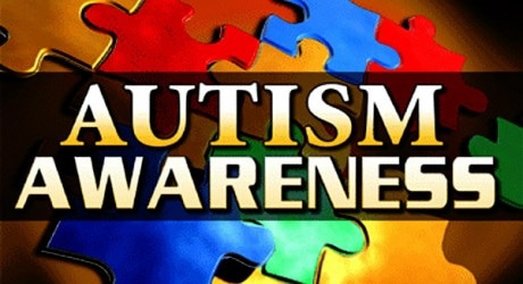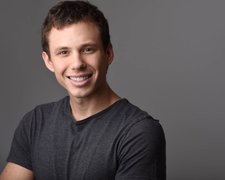 A special note from The Write Reflection: April is Autism Awareness Month. In an effort to spread awareness about autism, The Write Reflection will feature guest bloggers this month on the subject of autism. The first post in our series is written by Joshua Dushack. ********************************************* I was diagnosed with autism when I was eight years old. Before my diagnosis, I had uncontrollable temper tantrums that were hard for my parents to tolerate; I had odd obsessions, and was incapable of talking. One of my earliest odd obsessions was when I would see a telephone. My dad once told me that there was a time when we couldn’t enter a restaurant because I would see a public pay phone near the area, I would pick it up and place it on my ear and say, “Hello! Abadubdaduh… Bye, bye!” and hang up. I would repeat that routine for forty-five minutes straight. To make matters even stranger, I was very picky with my food. Because of that, and mostly because I still wasn’t talking after the age of four, my parents knew that something was wrong, but they just didn’t know what it was. Already parents of two children, they knew my behavior wasn’t improving compared to my older brother’s. In my early age, all doctors could say was that I would never learn how to read, write, or even how to talk. They even said that I would never go to school without any supervision. Soon after, my parents divorced and my mom raised my brother and I alone. With the exception of having me in a special pre-school, my mom denied what most doctors have said and placed me in a regular public school. In other words, she treated me like a “normal” child. Still, I attended special education classes while taking regular classes at the same time. I was even given a speech therapist at the school. Finally, when I turned six years old, I started talking. Although my speech at the time wasn’t at my age level (my sentences mostly consisted of four words), it was a big step. It wasn’t until I was eight years old that I began to speak progressively. My parents began to understand me and I was able to tell them what I liked and disliked. That same year, I was diagnosed with Autism Spectrum Disorder. I wasn’t aware of my diagnosis until I was told my young cousin (my dad’s nephew) had autism. I was twelve years old at the time. “Hunter has autism?” I asked. “Yes,” said my grandmother. “What is autism?” I asked. “That’s what you have,” said my older brother. That’s when I finally learned why people my age thought of me as “weird” even though I thought I was just a regular kid. That’s when I learned why I felt as if I didn’t belong where I was. That’s when I learned why I was taking different classes than most people, and why the subjects like Math and Reading seemed less compatible to the same subjects most of my classmates were learning. It finally dawned on me; and I knew right there, that there was really nothing wrong with me. I just needed to improve my social abilities a little further. I knew I had to stop talking to myself (repeating quotes from films and T.V. shows, which my parents call “T.V. Talking”) when I’m in public. I became more aware of my surroundings, and observed the way my classmates behaved around each other. I was even open with my dad teaching me social skills, like how to approach and talk to another person and be friends with them. One of the things he taught me, and that I ignored, was that not everyone was going to like me in spite of my good-hearted behavior. So I didn’t allow autism to take over my life. I later discovered that the only way I could express my autistic self without feeling unwelcome and discriminated was through theatre. Of course, I joined Stage Right Performing Arts after that. Even though I functioned differently than everyone else (I was still too shy to approach my classmates), I was nevertheless accepted into the group, and the students treated me like a human being rather than a creature from another planet. Acting played a huge part in me. I was able to express myself through another character, something that is frowned upon in society and accepted in the theatre. And they said the “T.V. talking” would never pay off! After graduating high school, I decided to go to college and study theatre. However, I learned the hard truth when attending college. It wasn’t as easy as I had hoped. Other subjects I learned concerning theatre had much to do with theatre history. I also had to learn stage makeup and how to make costumes, which were not only hard but I also had to spend a large amount of money for them. I had to retake some of the classes that I needed to improve on. I didn’t even ask for help; therefore, I found out during my fourth year, that I wouldn’t be able to graduate with most of my classmates. At that point, I was entirely depressed, so the first thing I did when I found out I wouldn’t be graduating in the spring was sit on my seat pondering. I thought, “How could I be so stupid?” Then I called my dad, knowing he would give me words of encouragement. He told me that this is not the end of the world, and that what matters more than graduating with my classmates in the spring was just to graduate in general. At that point, I knew he was right; I made a new discovery. So I went to the gym to warm up my mind, and to think of what I could do. Then, I decided to get some help. My college advisor and my family encouraged me to get another diagnosis and request for OVR (which my mom attempted years prior, but they said I didn’t qualify). During the winter of 2015, I was diagnosed with Autism Spectrum Disorder. After my diagnosis, I finally asked a counselor to view my results and see if I qualified for OVR. Not only did he think I qualified, but was shocked that I was denied it a few years earlier! I also went to therapy for a while based on the advice from a smart woman I’ve been courting for almost three years. The therapy helped, and now I am able to move forward to this day without the influence of a therapist. Also, as an aspiring theatre actor and singer, I currently volunteer as a mentor for children with autism at Stage Right Performing Arts as a mentor, which they call the Spectrum Theatre Class. My job as a mentor is to keep the students on track with their roles in the show and to perform with them. Despite my doubts, all of them never fail to surprise me. Most, if not all, perform the shows very well and do an amazing job, with mine, and the other mentors’ help as well during their performances. In November 2015, not long before I graduated college (I was taking a psychology course to complete my credits), my aunt invited me to a Temple Grandin Lecture that was occurring in Akron, Ohio. Since my aunt bought VIP tickets, benefits include Temple Grandin’s book The Way I See It (which is definitely a worthy read), an autograph, and a picture with her (of course, my aunt chickened out and left me in the dark…). Overall, I had fun! I was supposed to be starring in a play for my church that year, but the play never came forward. However, something even better happened to me! I got to meet a few people at the lecture that marked a new beginning of my career. It was there that I met Wendy S. Duke, the co-founder of Center for Applied Drama and Autism (CADA), where they give students with autism the opportunity to perform in the theatre. I told her I had autism myself and was writing a bully-prevention play, which she asked if she could read whenever I finished writing it. After I finished my play, Behind the Mask and got it edited, I sent it to her. She loved it! She even told me that she wanted to schedule a reading of my play for the spring! In December of 2015, I walked the ceremony at Seton Hill University, but didn’t receive my Bachelor’s at the time due to finishing my credits at another school, which turned my transcript in late. I received my Bachelor’s in May 2016, which was an exciting step for my family and I! Later that month, I drove all the way to Ohio to attend the reading of my play, Behind the Mask. The play consisted of a small cast (including my aunt, who volunteered to read one of the parts) and the attendance of a small audience. I even casted those who I felt fit the part very well. Not only was it a blast, I was given an enthusiastic reaction from the cast and the small audience that showed up! A day later, I taught the class some scriptwriting exercises. I was nervous because I never prepared any scriptwriting exercises, nor have I researched any. Instead, I made up my own exercise. So I asked them to form in a group of four or five, write down a page of their scene individually, and to mix each other’s scenes in a group and turn it into a play. Then I told them to take turns performing it on the stage. The class laughed and had a great time, and I moved forward to teach them a little improv after that. After class was over, I was paid a total of $150. I didn’t even expect a check from them! The story doesn’t end here, however. I was invited by CADA to attend a performance of The Glass Menagerie by Tennessee Williams. The show was outstanding, and the actors did a very great job. Laura Wingfield, the disabled character based on Williams’ sister, was portrayed as possibly having autism, which I thought made the story make more sense. After the performance, I was asked to be on the stage as a guest speaker to discuss my connection with the character Laura. After discussing it, Wendy officially announced that my play, Behind the Mask, is going to be lit for production. Although the date is not entirely certain, it is estimated that the show will be produced around the second weekend of September. At that point, I will make my debut as a professional playwright! I will conclude this article to let you know that this an enhanced version of two articles I have written for Autism Speaks. My first article went extremely viral, and was read by thousands and thousands of people on Facebook, making me a little famous. It has been reposted on the Autism Speaks Facebook Page for the past two years, and has never failed to bring hope to many of my readers, who say they themselves have children with autism, and was told by doctors that they would never learn to talk as well. Today, my life is starting to become more successful before my very eyes. I’m not entirely there yet, but I’m getting there. I’ve been writing blogs, I co-host a radio show called The Arun Mehta Show, I’m auditioning for plays, my own play is being produced, and I do some public speaking spreading awareness for autism and bully-prevention. I continue to do the things I love, and that’s what matters. Autism is not primarily who I am, as it is not primarily who you or your child is. It is only a part of me, and I wouldn’t change that for the world. If you are good at the things you enjoy, then you should just do it! As I said, autism is not who you are primarily, but only part of you. At least that’s my opinion. I may be autistic, but I’m also an actor, theatre artist, playwright, writer, blogger, public speaker, advocate, and most importantly, a human being. Let your heart guide you, and never let anyone say you can’t achieve anything. Nothing is impossible. This is my message for everyone on the autism spectrum – or maybe even anyone in general.  About the Author: Joshua Dushack is a playwright and writer born in Fortuna, California. He received a Bachelor of Arts at Seton Hill University and his play Behind the Mask will make its debut performance at the Center for Applied Drama and Autism in Akron, Ohio, which describes the issues of bullying and how it can be prevented. His famous article They Told My Parents I Wouldn’t Talk; Now I’m graduating from College, went instantly viral, and was shared by thousands of readers on Facebook. It is still posted on the Autism Speaks Facebook Page to this day. If you want to know more about Josh, follow him on Twitter, Linkedin, his Facebook group Autism: Inspirational Stories of Healing, and you can check out his blog posts and articles on Linkedin or blogs.setonhill. He lives in Pittsburgh, PA with his family.
0 Comments
Your comment will be posted after it is approved.
Leave a Reply. |
Categories
All
Archives
April 2024
|
